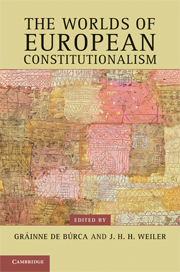Book contents
- Frontmatter
- Contents
- Contributors
- Introduction
- Prologue: global and pluralist constitutionalism – some doubts
- 1 The European Union as an international legal experiment
- 2 The place of European law
- 3 The ECJ and the international legal order
- 4 Local, global and plural constitutionalism
- 5 The case for pluralism in postnational law
- Dialogical epilogue
- Bibliography
- Index
Dialogical epilogue
Published online by Cambridge University Press: 05 June 2012
- Frontmatter
- Contents
- Contributors
- Introduction
- Prologue: global and pluralist constitutionalism – some doubts
- 1 The European Union as an international legal experiment
- 2 The place of European law
- 3 The ECJ and the international legal order
- 4 Local, global and plural constitutionalism
- 5 The case for pluralism in postnational law
- Dialogical epilogue
- Bibliography
- Index
Summary
Joseph H. H. Weiler and Bruno de Witte
JW: I would like to query the revision clause analysis which seems the apex of Section 1.3 of your chapter dealing with the relevance of the practice of the Member States in resolving the issue – international, yes or no.
At its heart the argument seems to flow as follows. In general international treaty law, revision is flexible and subject to a normal default rule of amendment by unanimity of the contracting parties. In concluding a treaty, parties may, however, specify a different revision procedure which, as is often the case, may provide for flexibility such as amendment by majority rather than unanimity. In the EU, by contrast, the revision provisions agreed by the parties are rigidified: not only is unanimity required, but further restrictions apply, such as the involvement of the EU institutions and ratification by each state according to its own constitutional requirements. Further, you correctly point out that, whereas under general international treaty law, the High Contracting Parties of a treaty can effectively amend it by a new treaty, riding roughshod not only over the provisions for conclusion under which the original treaty came into force, but even riding roughshod over the revision provisions in the original treaty. States, as you point out, are Masters of the Treaties they make, both as to form and as to substance. By contrast, you point out, under the EU, the Member States do not have this freedom of form. They must follow the procedural rules in the EU treaties in order to revise them. At least procedurally, they seem to lose something of their ‘mastery of the treaty’.
- Type
- Chapter
- Information
- The Worlds of European Constitutionalism , pp. 262 - 309Publisher: Cambridge University PressPrint publication year: 2011
- 3
- Cited by

